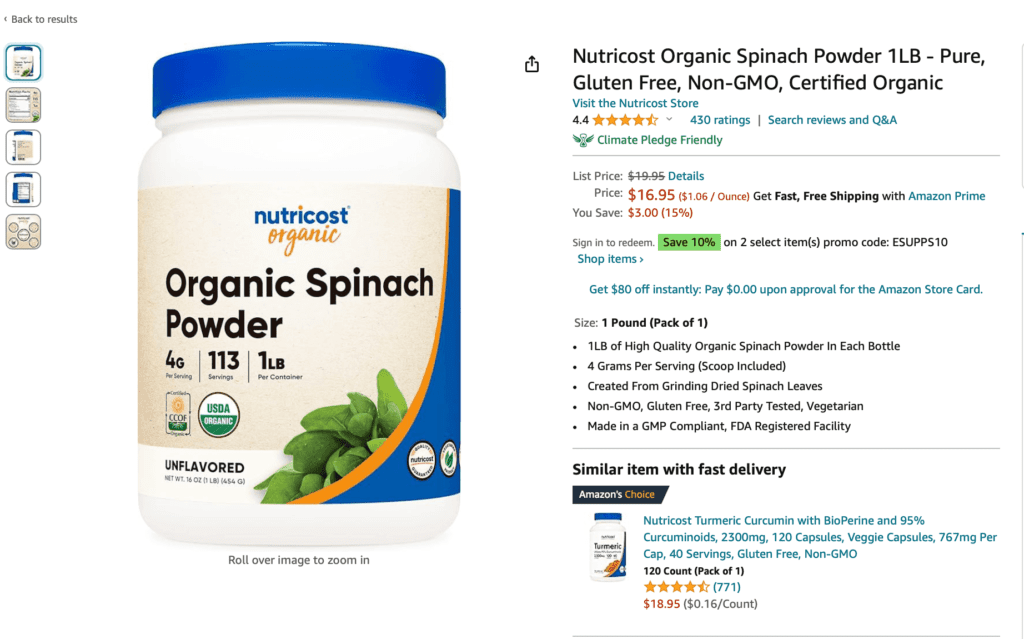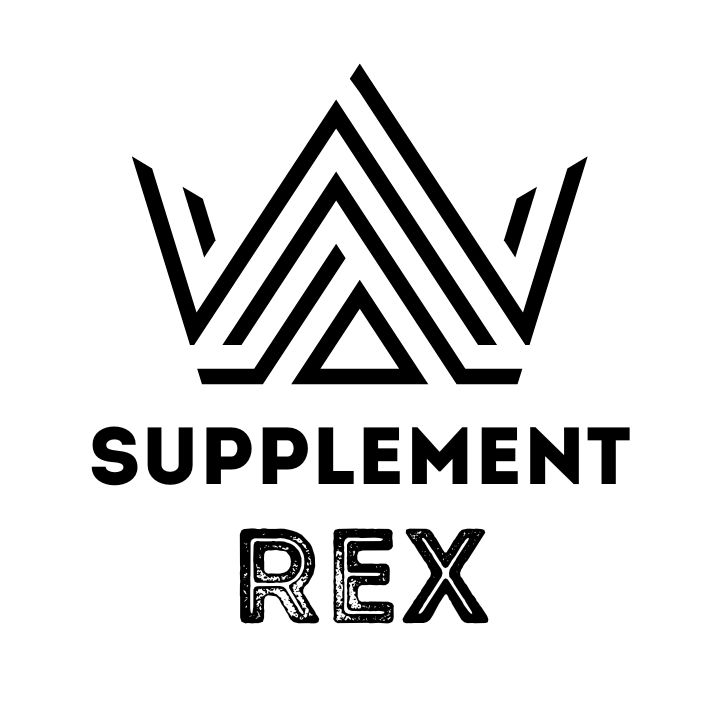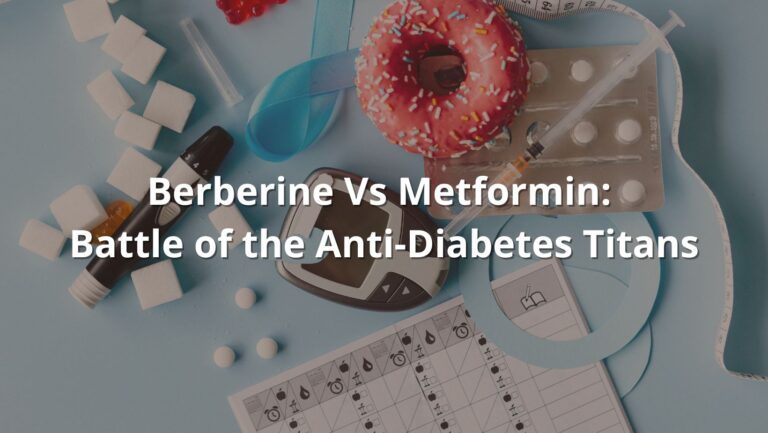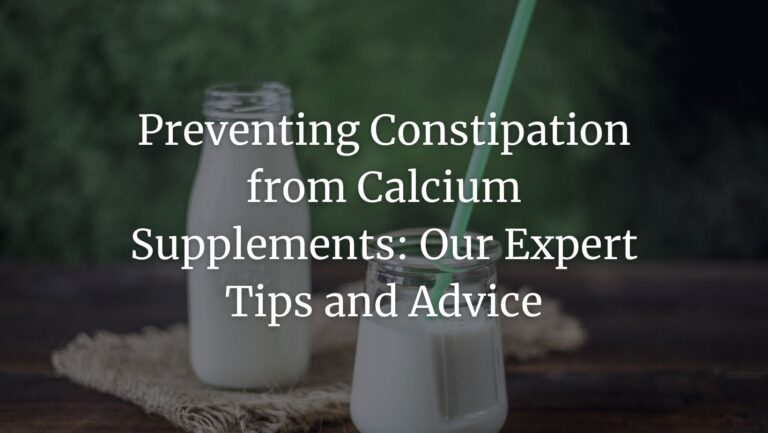Best Supplement for Insulin Resistance? My 2023 Guide as a Doctor
Are you looking to boost your metabolic health? Or, in simpler words, to avoid type 2 diabetes, heart disease, and various other chronic conditions. Tackling insulin resistance is a good place to start – and research shows 40% of Americans struggle with it.
Today, we’re looking for the best supplement for insulin resistance. Why? Because don’t we all want to have a single, easy-to-use solution to our health struggles. But, if that’s what you’re here for, I have bad news for you:
Supplements can support a healthy insulin response, but they’re not a complete solution.
Eating better and moving more are still the cornerstone of metabolic health. Prescription medication like metformin is important, too – if your doctor has prescribed it, take it and don’t think a supplement can replace the therapy.
Speaking of which, I am a doctor, not your doctor. None of this is medical advice, it’s just my own guide to the supplements we have based on the information we have.
How the information for this guide was gathered:
To write this piece, I searched electronic databases for randomised controlled trials testing dietary supplements for insulin resistance efficiency. This umbrella review of RCTs was also a great source, covering the 2015-2021 period. For 2021, 2022, and 2023 data, I searched through the databases myself. I only include supplement suggestions where there is some degree of evidence they help with insulin resistance.
Okay, disclaimers and informational notes aside, let’s get into the meat of it:
Insulin Resistance Supplements: Quick Picks
Are you here in a rush? Not really interested in all the nitty-gritty, just on the tips and core information? Here are the best supplements for insulin resistance – and by best I mean those that have some science to back them up:
- Vitamin D supplementation has directly improved insulin resistance markers in trial. Consider supplementing during the winter months & make sure you’re getting enough sunshine year-round.
- Magnesium has improved fasting blood glucose. Low magnesium can cause insulin resistance and increase your diabetes risk three times! To hit your daily magnesium levels, eat more greens and raw nuts – pumpkin seeds are perfect. 200-400mg of magnesium citrate is a good supplementation dose (but always check with your doctor).
- Zinc also improves fasting blood glucose. For best results, supplement with an inorganic zinc form like zinc sulphate.
- Probiotics can support a healthy metabolism plus impact a range of other health factors.
- Polyphenols in plants (especially those in berries) also have insulin-resistance-diminishing perks. You can include them in your diet or look for a berry powder to supplement your daily intake.
There are a range of other supplements we’ll cover in this guide, including pomegranate, selenium, and spinach extract. We’ll be looking at the claims + where the science and proof come from. I might be biased, but I do think there’s more useful things you can learn from this guide. So, if you decide to stay for the “long version” let’s dive right in:
Vitamin D: Directly Improves Insulin Resistance
Vitamin D is more than just a vitamin – it’s actually more accurate to think of it as a hormone – and this hormone plays a significant and complex role in your health. It regulates calcium absorption, for example, which is crucial for bone health. Vitamin D also plays a vital role in immune function, helping your body fight off infections and diseases.
When it comes to diabetes and vitamin D, there’s still a lot we don’t know. A deficiency in this vital nutrient has been linked to insulin resistance, a key factor in the development of Type 2 Diabetes.
What about supplementation? Trials have found a small, but statistically significant impact of vitamin D supplements on insulin resistance markers. In the “Efficacy and Safety of Nutrient Supplements for Glycaemic Control and Insulin Resistance in Type 2 Diabetes: An Umbrella Review and Hierarchical Evidence Synthesis” review, vitamin D was actually the only nutrient to directly improve insulin resistance.
That said, the difference was very subtle – this isn’t a game-changer in itself but a solid support for your efforts. On the bright side, vitamin D has additional perks – for example, calcium citrate and vitamin D are a solid duo for osteoporosis.
If you’re concerned about your insulin sensitivity or are already managing Type 2 Diabetes, it may be a good idea to check your vitamin D levels. Getting enough vitamin D is often as easy as spending an extra 15-20 minutes outside. During the colder months, a vitamin D supplement can be helpful (I personally take 600IU/day during the winter but if your levels are low to begin with your doctor may recommend more).
By the way, if you’re interested in how “vitamin D” is more a hormone, check out this video. As usual (with the videos I include on the site), it’s not sponsored – in fact, I don’t even know the people who produced it personally. It is, however, a helpful educational source for those who want to learn more:
Magnesium
Magnesium is one of those unsung heroes in the world of nutrients. It’s involved in over 300 enzymatic reactions in the body, from muscle function to nerve transmission. But what really should catch your eye is its role in regulating blood sugar levels: You see, magnesium acts like a key that opens the doors to your cells, allowing sugar to enter and be used for energy. When you’re low on magnesium, those doors don’t open as easily, leading to insulin resistance.
Now, let’s talk science. In trial, magnesium has shown its potential to improve fasting blood glucose levels. While it may not be the magic bullet for reversing Type 2 Diabetes, it’s a strong supporting actor in your health journey.
So, what can you do about it? First off, consider adding magnesium-rich foods to your diet. We’re talking leafy greens, nuts, and whole grains. These foods are not only packed with magnesium but also come with a host of other health benefits. Pumpkin seeds are my personal, all-time favorite as they provide nearly 40% of your daily magnesium needs in a single serving.
If you’re thinking about supplementation, it’s always best to consult your healthcare provider for personalized advice. Most people take between 200 and 400 mg per day but always stick to what your doctor told you. Small studies show magnesium aspartate, citrate, lactate, and chloride to be better absorbed so look for these forms if possible.
Zinc
Zinc is often associated with immune health, but its role extends far beyond just keeping the common cold at bay. This trace element is a multitasker, involved in everything from wound healing to DNA synthesis.
Much like magnesium, zinc has the potential to improve fasting blood glucose levels. However, it didn’t show a significant impact on long-term blood sugar control, measured by HbA1c levels.
If you’re looking to up your zinc intake, foods like shellfish, legumes, and nuts are excellent places to start.
For those considering a supplement, you’re usually aiming for about 15mg per day. In studies, higher doses were used (up to 52mg/day) but this is is a little too close to the safe limit. Stick to the recommendation on the package and choose an inorganic zinc supplement like zinc sulphate, which was found to be more effective than organic forms.
Probiotics
Probiotics are good bacteria, like Lactobacillus and Bifidobacterium, that you can take as supplements. They can support your gut microbiome which, in turn, impacts your health.
Animal studies show that probiotics can help improve insulin sensitivity, meaning your body uses insulin more effectively. They also improve lipid profiles (your fats in the blood) and reduce signs of inflammation and oxidative stress, which means additional disease-preventing benefits.
In human studies, results are mixed but mostly positive. Out of seven studies looked at in one reviews, five showed benefits in making insulin work better in the body.
So, Should You Take Probiotics for Insulin Resistance?
The science is promising but not 100% clear yet. Probiotics could be a good add-on to other treatments and lifestyle changes like diet and exercise. Plus, we’re not 100% agreed on whether taking bacteria in pill form actually makes a difference in your gut microbiome.
For the time being, two things are clear:
- More research is needed to confirm how effective probiotics are for treating insulin resistance in humans.
- Maintaining a healthy gut through a diverse diet & microbe-friendly foods (fermented foods like yogurt and kimchi + fibre-rich foods to feed the bacteria) can support a healthier insulin response along with a range of other health benefits.
By the way, there are other supplements (not just probiotics) you can take for your microbiome. Check out my recent article on the vitamins for gut health that show promise to learn more.
Polyphenols
Polyphenols are a group of nutrients you find in plants and they come with a range of potential perks. In the plant, they protect cells from free radical damage among other functions. Some polyphenols also play a role in the taste, color, and smell of food (e.g., anthocyanins give berries their red color AND they are also antioxidants).
When it comes to insulin resistance, there are several mechanisms by which polyphenols can help. But, not all polyphenols are created equal. For now, epicatechin and anthocyanins show the most promise. You’ll find both polyphenols in berries (raspberries and blackberries are excellent sources of anthocyanin and epicatechin; you’ll also find epicatechin in apples and pears).
If you prefer to go the supplement route, a range of polyphenol supplements are available on the market. Berry extracts are a solid option for insulin sensitivity in particular. For example, this Super Reds drink packs 48 different fruit and berries for some powerful antioxidant activity. It’s also a money-savvy choice at under $20 for the package.
Still, whether you supplement or not, a diverse diet is where it’s at. If you pick up the super reds drink, for example, try it in a smoothie with some fresh fruit, maybe a nut butter for satiety, and your milk of choice.
Pomegranate Extract? The Results from the Latest RCT Are In…
Moving down to somewhat more exotic supplements, a recent randomised controlled trial looked at pomegranate peel extract in patients with non-alcoholic fatty liver disease (NAFLD). This liver condition often goes hand in hand with metabolic syndrome (of which insulin resistance is part.)
During the 8-week trial NAFLD patients were given either a placebo or pomegranate peel capsules along with a calorie-deficit diet. The results showed significant improvements in various health markers like body weight, waist circumference, blood pressure, and cholesterol levels for those who took the pomegranate peel extract.
However, it didn’t show significant changes in insulin resistance.
There is previous research linking pomegranate with a better insulin response. In another randomised controlled trial pomegranate juice did have the blood-sugar-lowering impact. We also have some previous studies on animal models. So, what should we take away from this last RCT?
Well, it seems the answer is not in the peel, right? 😀
Jokes aside, it seems like we simply need more research. Pomegranate is a nutrition powerhouse and an important fruit in the heart-healthy Mediterranean diet. It doesn’t seem like you need a fancy supplement for it, though. Simply picking up a pomegranate as a snack should be enough to get you those metabolism-boosting perks.
Spinach Extract
Another less popular supplement, spinach extract was also recently studied for insulin resistance. This 2023 RCT investigated the combined effects of high-intensity functional training (HIFT) and supplementation with spinach-derived thylakoid on.
Participants were divided into four groups:
- Control
- Supplement
- Training
- Training + Supplement.
After 12 weeks of HIFT and thylakoid supplementation, researchers saw significant improvements in insulin resistance markers and adipokines. Participants also experienced increases in beneficial adipokines like adiponectin and omentin.
But, there is a caveat here. This study specifically targeted men with obesity – the results may not be generalizable to other populations. Still, this is a great start – and look no further if you need some extra motivation to get your greens in.
You can also get spinach in powder form – this 1LB organic powder is an affordable and high-quality option:


Selenium
Finally, let’s get to a micro element that we mentioned above but didn’t dive into the latest study on it. Last year, this was a randomised controlled trial on the effects of selenium supplementation on infertile women diagnosed with polycystic ovary syndrome (PCOS) who were undergoing in vitro fertilization (IVF). And, yes, I know, this is very specific – studies have to be. Still, it’s an RCT with some real perks reported, so I thought it’s important to mention.
In this study, women received either 200 μg/day of selenium or a placebo for 8 weeks. The trial found that selenium significantly lowered fasting glucose, insulin resistance, and fasting insulin levels.
One of the best things here? PCOS often comes with insulin resistance – and, often, it’s long-lasting, not-particularly-easy-to-address insulin resistance, The study only lasted 8 weeks. So, now we know even short-term selenium supplementation can have beneficial effects on insulin metrics.
Just like the study above, however, this one is also limited by its group. Selenium worked for these women – that doesn’t mean it will work in a different population. Still, considering it’s a relatively safe and well-tolerated supplement, it could be worth a try along with your diet and exercise regimen.
Conclusion (a.k.a. Final Words & Tips on Metabolic Health)
Boosting metabolic health is something we’ll need more and more. Unfortunately, humans are eating less metabolically-friendly diets and living to see the consequences. If you want to change your insulin sensitivity destiny, supplements can offer support, but they’re not a silver bullet.
Eating a balanced diet and staying active remain the cornerstones of managing insulin resistance. Prescription medications like metformin also play a critical role when advised by a healthcare provider.
The supplements we covered in this guide—vitamin D, magnesium, and zinc—have shown promise in improving insulin resistance markers. Vitamin D, in particular, is the only nutrient to have a direct, albeit subtle, impact on insulin resistance according to scientific reviews, not just isolated RCTs.
Magnesium acts as a cellular “key,” aiding in blood sugar regulation, while zinc also shows potential in improving fasting blood glucose levels. Both are essential but should be part of a broader health strategy. Selenium, although studied in a very specific population, also showed short-term benefits on insulin metrics, making it an interesting avenue for future research.
Emerging research on probiotics, polyphenols, and even more exotic options like pomegranate and spinach extracts, indicate potential benefits but require more conclusive studies for a clear verdict.
The takeaway? Supplements can be a valuable addition to your health regimen, but they’re most effective when combined with a balanced diet and regular physical activity. Always consult your healthcare provider for personalized advice.
Finally (and an important reminder for impatient folks like myself), remember the journey to better metabolic health is a marathon, not a sprint. Every step you take brings you closer to your goal.


![NMN Supplement [2023-Updated] – Buyer Guide, Reviews, Science & Everything Else You Need to Know](https://supplementrex.com/wp-content/uploads/2023/06/nmn-supplement-768x433.jpg)




